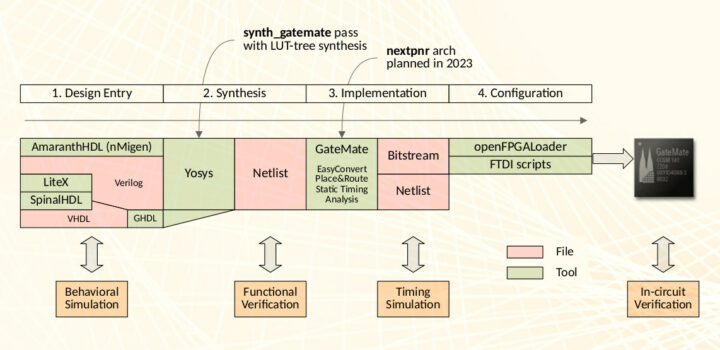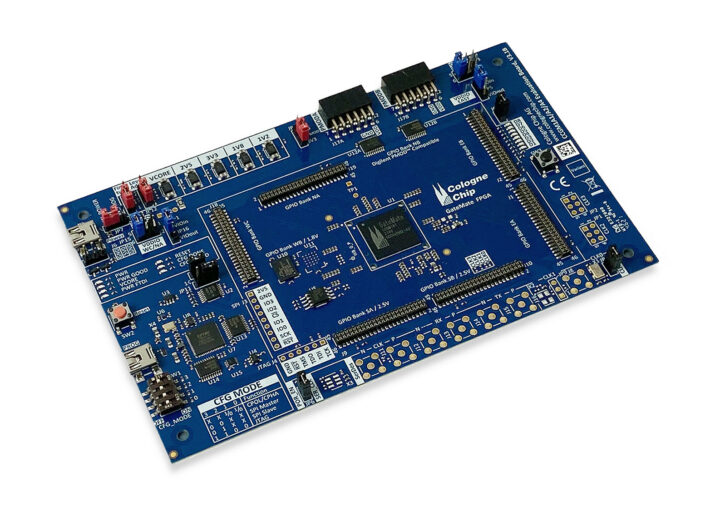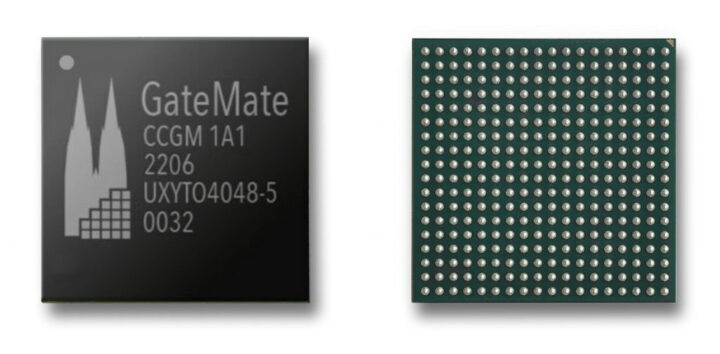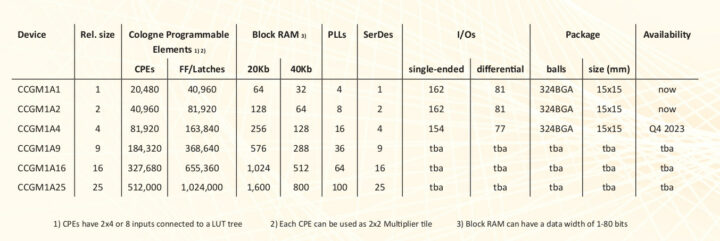Cologne Chip GateMate A1 is an FPGA with 20,480 logic elements best suited for lower-power applications and programmable with an open-source toolchain based on nMigen, Yosys, and other open-source tools.
The A1 FPGA also comes with 1,280 Kbit block SRAM, four PLLs, a quad SPI interface up to 100 MHz, a 5Gbps SerDes interface, and the company offers an evaluation board to get started with development.
GateMate A1 specifications:
- CPE Architecture
- 20,480 programmable elements (CPE) for combinatorial and sequential logic
- 40,960 Latches / Flip-Flops within programmable elements
- CPE consists of LUT-tree with 8 inputs
- Each CPE is configurable as a 2-bit full-adder or 2×2-bit multipliers
- Features
- 4x programmable PLLs
- quad SPI interface up to 100 MHz
- 1,280 Kbit dual-ported block RAM with variable data widths in 32 x 40 Kbit RAM cells
- Multipliers with arbitrary size implementable in CPE array
- Multiple clocking schemas
- All 162 GPIOs are configurable as single-ended or LVDS differential pairs
- Double data rate (DDR) support in all GPIO cells
- 5 Gb/s SerDes
- Power modes – low power (0.9V) , economy (1.0V), speed (1.1V)
- Power Supply
- No excessive start-up currents
- Only two supply voltages needed and can be applied in any order
- Package – 324-ball BGA package (15×15 mm)
- Process – Globalfoundries 28 nm SLP (Super Low Power) process
As we can see in the table above, the company is also working on higher-end FPGA based on the same architecture but with up to 512,000 logic elements, up to 37,768,000 bits of block RAM, and up to 100 PLLs.
Cologne FPGAs are programmable with the Yosys framework coupled with a proprietary, but free-of-charge, place & route tool. You’ll need to register on the company’s website to have access to the pre-built binaries for Linux or Windows. Somehow the registration form does not work for me as I’m not receiving the verification email… And the documentation also gives direct access to the pre-build toolchains for Linux and Windows, plus instructions to build the tools from source.

The company also provides the GateMate A1 FPGA evaluation board with the following specifications:
- FPGA – GateMate A1 FPGA described above
- Memory & storage
- 64 Mbit HyperRAM @ 166 MHz
- 64 Mbit Quad-I/O SPI flash @ 80 MHz
- Unpopulated footprint for secondary HyperRAM or HyerFlash module
- Interfaces
- USB-JTAG + USB-SPI configuration interface
- 2 Pmod-compatible ports
- SerDes interface via SMA
- 6x GPIO banks
- Power
- Powered from USB
- Adjustable Vcore (0.9-1.1V)
- Dimensions – 160×100 mm (Eurocard standard)
 The new FPGA may be especially interesting to European users as Cologne Chip is a German company so they can be shielded from import taxes and potential trade restrictions. They also happen to be sponsored by the German government, more exactly the Federal Ministry of Economic Affairs and Energy.
The new FPGA may be especially interesting to European users as Cologne Chip is a German company so they can be shielded from import taxes and potential trade restrictions. They also happen to be sponsored by the German government, more exactly the Federal Ministry of Economic Affairs and Energy.
The GateMate A1 FPGA evaluation board can be purchased on Elpro for about 259 Euros or Digikey for an undisclosed price since they don’t like my IP address and I’m lazy using a VPN just to check the price. But if you can wait, Olimex has published a tweet saying they had started working on a Cologne GameMate A1 board and it should offer performance similar to the AMD Xilinx Spartan 7. More details, including the documentation to get started, can be found on the product pages for the chip and evaluation board.

Jean-Luc started CNX Software in 2010 as a part-time endeavor, before quitting his job as a software engineering manager, and starting to write daily news, and reviews full time later in 2011.
Support CNX Software! Donate via cryptocurrencies, become a Patron on Patreon, or purchase goods on Amazon or Aliexpress. We also use affiliate links in articles to earn commissions if you make a purchase after clicking on those links.






It has way more resources than most Spartan 7 SKUs(and thus boards) except for DSPs. We would have to see how designs map to those resources as their architecture is pretty different from each other.
E.g. This FPGA seems to have more primitive clocking routing when compared to Xilinx ones in Spartan 7 and one which can consume normal routing or resources(like the carry/propagation lines).
There are other differences like how the registers/flip-flops in a configurable block in the Gatemate seems better as don’t appear to be as restricted as Xilinx 4 main + 4 alternatives ones.
I’d like to get into FPGA design and would really prefer to stay all open source. Is there any cost effective product for that?
With opensource toolchain I only tried icesugar from aliexpress.
I also tried gowin fpgas which have cheap (<$50) boards on aliexpress. Gowin has closed source but manageable toolchain (ie. not > 100 GiB like some others) for synthesis and you can do basic simulation with opensource tools.
There are also used zynq boards on aliexpress for ~$30-40 from some bitcoin rig (they are quite a steal), but the toolchain for that is massive and not FOSS. They’re also not as simple to get up and running, if you like to understand things, use mainline code, and not just use prebuilt stuff from somebody else. And the 130+ GiB toolchain is a pain in the butt if you like simple and predictable things.
1bitsquared icebreaker is a great beginners board and has lots of example projects
Olimex also has a compatible fpga board available
$81.25 from Digikey.
Seems the CNX link to Digikey is only for the programmer (small board on the picture in Elpro). Ehnce the big price difference.
Here seems to be the main dev board listing on Digikey:
https://www.digikey.com/en/products/detail/cologne-chip/CCGM1A1-E1-31B/16087880
Price: $248.75 or 225,64 €
Honestly, that’s pretty expensive, that’s basically the price of a Cyclone V board from Terasic and it doesn’t have the stuff it has. Zynq boards are generally cheaper or you can get some decent Artix/Spartan board too.
Unless you have some professional need for it, I guess.
Isn’t it a programmer only?
Hi Jean-Luc,
can you correct your headline?
It’s called cologne named after the german city (Köln)
Greetings from the rhine river
Sorry about butchering the company’s name a few times in the title and article. I’ve corrected it.
@cnxsoft – “Cologne” is spelt wrong multiple times.
Cologne Chip was once famous for their ISDN chipsets, haven’t heard much from them since.
Was about to write the same.
Surprising they are still around.
The FPGA chip costs $25.45697 qty 119 in Digikey
Cologne Chip has recently released an Integrated Logic Analyzer for the GateMate FPGA as an open-source project on GitHub: https://github.com/colognechip/gatemate_ila